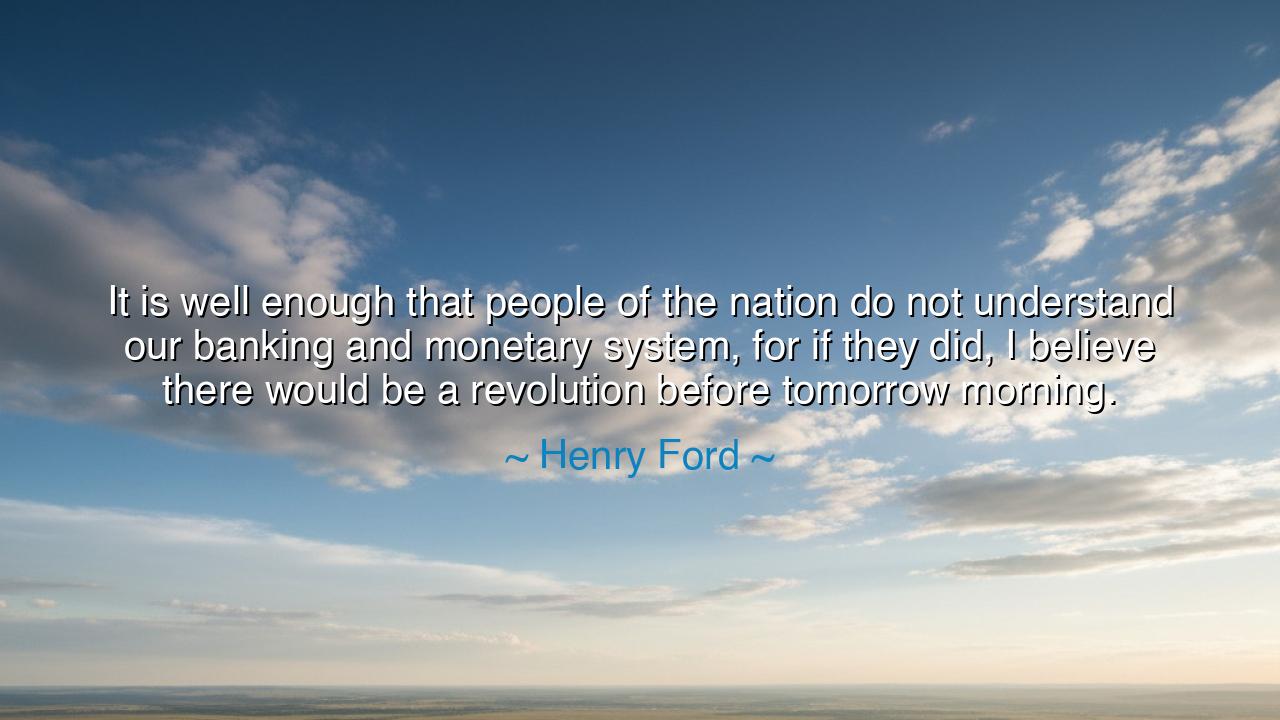
It is well enough that people of the nation do not understand
It is well enough that people of the nation do not understand our banking and monetary system, for if they did, I believe there would be a revolution before tomorrow morning.






Hear the striking words of Henry Ford, a man who transformed the age of industry and yet spoke with prophetic unease: “It is well enough that people of the nation do not understand our banking and monetary system, for if they did, I believe there would be a revolution before tomorrow morning.” These are not idle words, nor the exaggeration of a restless tongue. They are a warning, a confession, and a glimpse into the hidden engines of power that move beneath the surface of nations.
When Ford speaks of banking and the monetary system, he speaks of forces largely invisible to the common man—currencies issued, debts created, wealth shifted in silence from many to few. He reveals the gap between appearance and reality: the people see coins and notes, wages and prices, but behind them lies a machinery designed not for fairness but for profit and control. To expose this to the multitude, he feared, would tear away the veil of trust and summon the fury of the masses.
His mention of revolution is not metaphorical. For history shows that when people grasp the full extent of exploitation, they rise. Think of the French Revolution, when peasants starved while nobles feasted, and the cries for bread became cries for blood. Or the American Revolution, when taxation without representation led to rebellion against the crown. In every age, the balance between ruler and ruled is fragile, and when deceit is unmasked, upheaval follows swiftly, like lightning after storm clouds gather.
Ford’s own time bore witness to such tensions. The early 20th century was an age of trusts, monopolies, and robber barons, where vast fortunes were made by few while many labored in poverty. Though Ford gave the world the affordable automobile, he was no stranger to the inequities of finance. His quote arises from this context: a recognition that the system was crafted in shadows, and that its truth was too dangerous for popular eyes.
Yet there is another layer of wisdom here: that ignorance, though it shields against despair, also enslaves. To not understand is to remain docile, to accept conditions as natural that are in fact constructed. Ford’s words challenge us, though perhaps unintentionally, to ask: should we be content in ignorance? Or is it our duty to pierce the veil, even if what we find unsettles the foundations of our world? For without knowledge, no people can claim to be truly free.
The deeper meaning, then, is that power is often maintained not by force, but by silence. Those who control wealth need not always control armies; it is enough to control understanding. A quiet populace, lulled by the comforts of distraction, may never question the roots of its struggle. But the awakened populace, who understands the levers of debt, credit, and currency, becomes a force no tyranny can withstand. Thus Ford’s words are both a revelation and a challenge: beware what you do not know, for ignorance itself is a chain.
The lesson for us is clear. Do not turn away from the hidden workings of the systems that shape your life. Whether in money, in politics, or in power, seek understanding. Read, question, study, and awaken. For if knowledge can spark a revolution, then ignorance ensures quiet submission. The practical action is this: learn how money is made, where it flows, and who controls it. Speak of it, teach it, and make choices not as a blind follower but as a conscious actor in the theater of the world.
Thus, Ford’s warning becomes for us a summons. Whether he feared revolution or merely foresaw it, his words remind us of the ancient truth: knowledge is dangerous, but ignorance is slavery. And though the morning he spoke of has long passed, the choice remains with every generation—whether to sleep in silence, or to rise with understanding, and claim the dawn as free men and women.






AAdministratorAdministrator
Welcome, honored guests. Please leave a comment, we will respond soon